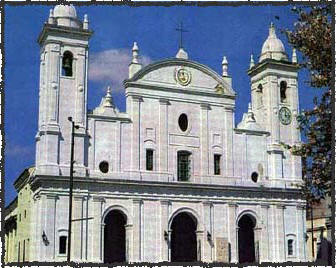|
||||||
|
History
The original inhabitants of eastern Paraguay were the semi-nomadic Guaraní. Several hunter-gatherer groups, known as Guaycurú, populated the Chaco. In 1524, Alejo García became the first European to cross Paraguay, with the aid of Guaraní guides. Three years later, Sebastián Cabot sailed up the Río Paraguay but founded no settlements. This was left to Pedro de Mendoza, whose expedition settled at Asunción after fleeing Buenos Aires. The colony flourished, becoming the nucleus of Spanish settlement in southeastern South America and sparking an era of intriguing socialization. The native Indian population gradually absorbed the Spaniards, who in turn adopted Guaraní food, language and customs. Over time, a Spanish-Guaraní society emerged, with Spaniards dominating politically, and the mestizo offspring adopting Spanish cultural values. |
|
|
Colonization also meant that Jesuit missionaries were sent to civilize the Indians. This they did with alacrity and skill. The Indians were induced to leave their lands and settle in reducciones, theocratic communes, where they helped build churches, grew deft at masonry, sculpture and painting, and sometimes gained a classical education along the way. After the expulsion of the missionaries in 1767, the settlements quietly withered as the Indians skedaddled or were employed by different masters.
Paraguay declared independence in 1811 - which Spain did not oppose - and within a few years it was under the thumb of the xenophobic José Gaspar Rodríguez de Francia, also known as 'El Supremo.' He sealed the country's borders, promoted a policy of self-sufficiency (even forcing the Spanish upper class to intermarry with the mestizo) and expropriated the properties of landowners, merchants and the Church. He died in 1840 and his remains were later disinterred and flung into a river. Francia's successor, Carlos Antonio López, ended Paraguay's isolation and began modernization. Unfortunately, he also spawned a megalomaniacal son who set about destroying the country by starting the catastrophic War of the Triple Alliance (1864-70) against Argentina, Uruguay and Brazil. When the smoke had settled, Paraguay had lost over 150,000 sq km (58,500 sq mi) of territory and almost a quarter of its population, including López junior.
After the war, Paraguay's agricultural sector was resuscitated by a new wave of European and Argentine immigrants, but political instability continued. At the turn of the century, cross-border tensions arose after Bolivia occupied disputed parts of the Chaco. The prospect of vast deposits of oil in the region (which proved non-existent) catapulted the two countries into war in 1932. The Bolivian army was pushed out of most of the Chaco and a subsequent treaty awarded Paraguay three-quarters of the territory.
Paraguayan politics became even more turbulent following the Chaco War, until a brief civil war brought the Colorado Party to power in 1949. A military coup in 1954 saw General Alfredo Stroessner installed as president. A vainglorious man with a firebrand temper, Stroessner employed torture, murder, political purges and bogus elections to remain in power for the next 35 years. The inimical dictator was overthrown in 1989 and was replaced by another brasshat, General Andrés Rodríguez. Despite considerable scepticism about his intentions - Rodríguez was Stroessner's former right-hand man - the country's perennial state of emergency was cancelled, censorship was eliminated, opposition parties were legalized and political prisoners released.
Paraguay enjoyed increasing political stability until the 1993 election of Juan Carlos Wasmosy, a free-market zealot and former member of Stroessner's faction, whose presidency inspired a disturbing number of nationwide strikes. Wasmosy himself came under scrutiny for shady business dealings associated with Paraguay's massive hydroelectric projects.
In May 1998, the Colorado Party reconfirmed its staying power with the election of President Raul Cubas, an electrical engineer who assumed the party's candidacy after former army General Lino Oviedo, their original nominee, was imprisoned mid-campaign on charges of rebelling against Wasmosy in 1996. Just when things again began to look rosy, Cubas too came under fire, accused of abusing his powers by freeing Oviedo from prison despite Supreme Court orders to keep him there. When Vice President Luis Argaña was gunned down by assassins in March 1999, popular sentiment linked Cubas and Oviedo to the murder and Cubas was forced to resign from office. Luis Gonzalez Macchi, who had been president of the Senate, was sworn in, while Cubas and Oviedo sought asylum in neighboring countries. |
|

